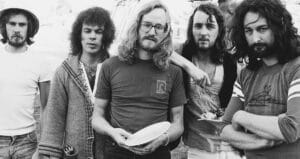Mike Oldfield: A Pioneer of Progressive and Instrumental Music
Mike Oldfield is a British composer, multi-instrumentalist, and producer, best known for his groundbreaking work in progressive rock and instrumental music. His work often blends a wide variety of genres, including rock, classical, folk, and electronic, with a strong emphasis on intricate, layered compositions and innovative instrumental arrangements. Oldfield’s ability to create complex, atmospheric soundscapes has made him one of the most influential musicians in the world of progressive rock.
1. Early Life and Career
1.1 Birth and Early Years
- Mike Oldfield was born on May 15, 1953, in Reading, Berkshire, England. He began playing the guitar at an early age and was soon known for his remarkable skill in both playing and composing music. His early years were marked by a variety of musical influences, which would later contribute to his distinctive, genre-defying style.
1.2 Early Musical Ventures
- In the early 1970s, Oldfield became involved in the Berkshire music scene, and by 1971, he was already working as a session musician, recording with various artists.
- His early musical collaborations include playing on Kevin Ayers‘ album Whatevershebringswesing (1972) and contributing to works by other artists. However, it wasn’t until 1973 that he would release the album that would make him famous.
2. Breakthrough: Tubular Bells (1973)
2.1 A Landmark Album
- Tubular Bells (1973) is widely regarded as one of the most innovative and influential albums in the history of progressive rock. The album was released on Virgin Records, founded by Richard Branson, and marked a major breakthrough for both Oldfield and the record label.
- The album features a combination of rock, classical, and electronic elements and is best known for its complex arrangements and use of a wide range of instruments. Oldfield played most of the instruments himself, including guitar, bass, piano, synthesizers, and percussion.
2.2 A Revolutionary Work
- The album is split into two tracks, and its most famous section is the opening Tubular Bells Part One, which was later used as the theme for the 1973 horror film The Exorcist, making it an iconic piece in both music and cinema history.
- **Tubular Bells was groundbreaking not only because of its instrumental complexity but also because it helped establish Virgin Records as a major force in the music industry.
3. Continued Success and Musical Evolution
3.1 Hergest Ridge (1974)
- Following the success of Tubular Bells, Oldfield quickly released his second album, Hergest Ridge (1974), which expanded on the instrumental rock style of its predecessor.
- The album features two long tracks, similar to Tubular Bells, and explores themes of nature, isolation, and serenity. It also has more atmospheric qualities and is considered more introspective compared to Oldfield’s debut.
- Key Tracks:
- Hergest Ridge Part One
- Hergest Ridge Part Two
3.2 Ommadawn (1975)
- Released in 1975, Ommadawn continued Oldfield’s exploration of instrumental music, blending rock, Celtic, and world music influences. The album again consists of two long tracks and is notable for its use of traditional instruments, including pipes and flutes.
- Ommadawn is often considered one of Oldfield’s most emotionally resonant works, featuring lush soundscapes and an almost meditative feel. It’s widely regarded as a high point in his career.
- Key Tracks:
- Ommadawn Part One
- Ommadawn Part Two
3.3 Incantations (1978)
- Released in 1978, Incantations features a four-part suite that mixes progressive rock, classical, and ethnic music elements. The album is more orchestral than its predecessors and has a distinct New Age quality.
- Although not as commercially successful as Tubular Bells or Hergest Ridge, Incantations solidified Oldfield’s status as a virtuoso composer and performer.
- Key Tracks:
- Incantations Part One
- Incantations Part Four
4. Commercial Success in the 1980s
4.1 Five Miles Out (1982)
- In 1982, Oldfield released Five Miles Out, marking a shift in his musical approach toward more radio-friendly, synth-driven compositions. The album features a mix of instrumental tracks and vocals, with John Miles providing vocals on the track Family Man.
- This album marked a return to pop music influences and further established Oldfield as a versatile composer and performer.
- Key Tracks:
- Family Man (a pop rock single)
- Five Miles Out (an instrumental piece with complex arrangements)
4.2 Crises (1983)
- Crises (1983) is another notable 1980s album that blends instrumental rock with pop elements. The album’s biggest hit, Moonlight Shadow, features vocals by Maggie Reilly and became one of Oldfield’s most popular songs.
- Crises was a commercial success, reaching high positions on international charts and gaining significant airplay.
- Key Tracks:
- Moonlight Shadow
- Shadow on the Wall
5. Later Work and Legacy
5.1 Tubular Bells II (1992)
- In 1992, Oldfield returned to his most iconic work, releasing Tubular Bells II, a re-recording of the original Tubular Bells, with modern production techniques and additional instrumentation. The album was a commercial success and introduced a new generation to Oldfield’s work.
- The success of Tubular Bells II revitalized his career, leading to additional projects that continued to explore both progressive and instrumental rock.
5.2 The Millennium Bell (1999)
- Released in 1999, The Millennium Bell was a reflection of Oldfield’s fascination with the turn of the millennium and featured an array of musical styles, including rock, ambient, and ethereal sounds.
- The album received mixed reviews but continued to showcase Oldfield’s diverse musical range.
5.3 Man on the Rocks (2014)
- Man on the Rocks marked a significant departure from Oldfield’s earlier work. It featured a more pop-rock sound and vocals, signaling his desire to explore new musical territory. The album was positively received by critics but did not achieve the same level of commercial success as his earlier instrumental works.
6. Mike Oldfield’s Musical Style and Influence
- Mike Oldfield’s music is characterized by its complexity, layered arrangements, and instrumental virtuosity. He is known for his ability to play a wide variety of instruments, often recording multiple layers of guitars, keyboards, drums, and synthesizers himself.
- His work has had a profound impact on the progressive rock genre and has influenced countless musicians in ambient, new age, and electronic music.
6.1 Instrumental Mastery
- Oldfield is renowned for his ability to craft long, instrumental suites that take listeners on a journey, using repetition and gradual development to create a sense of build-up and evolution in his music. His work in Tubular Bells and Ommadawn is often cited as an example of his pioneering use of multi-tracking and looping.
6.2 Genre-Blending
- Oldfield has always been willing to explore a variety of genres, including rock, classical, folk, ambient, and electronic music. This versatility has allowed him to maintain a diverse and evolving sound throughout his career.
7. Notable Collaborations
- Maggie Reilly: Collaborated with Oldfield on several albums, providing vocals for tracks like Moonlight Shadow and Family Man.
- : The lead singer of , Anderson collaborated with Oldfield on the album Amarok (1990), contributing vocals and lyrics to some of the album’s sections.
8. Fun Facts About Mike Oldfield
- Self-Taught Musician: Oldfield is a largely self-taught musician, mastering a wide range of instruments, including guitar, bass, drums, keyboards, and more.
- Influence on Soundtracks: His work on Tubular Bells earned him a prominent place in film history, with the album’s opening section being used in The Exorcist (1973).
- Prolific Output: Oldfield has released over 20 studio albums throughout his career, showcasing his ability to innovate and adapt to various musical styles.
9. Discography Overview
Studio Albums
- Tubular Bells (1973)
- Hergest Ridge (1974)
- Ommadawn (1975)
- Incantations (1978)
- Five Miles Out (1982)
- Crises (1983)
- Discovery (1984)
- Islands (1987)
- Amarok (1990)
- Tubular Bells II (1992)
- The Millennium Bell (1999)
- Man on the Rocks (2014)
Mike Oldfield’s work has left an indelible mark on the landscape of progressive rock and instrumental music. His ability to weave complex, emotive compositions has ensured his lasting legacy as one of the most innovative and influential musicians of his time.




